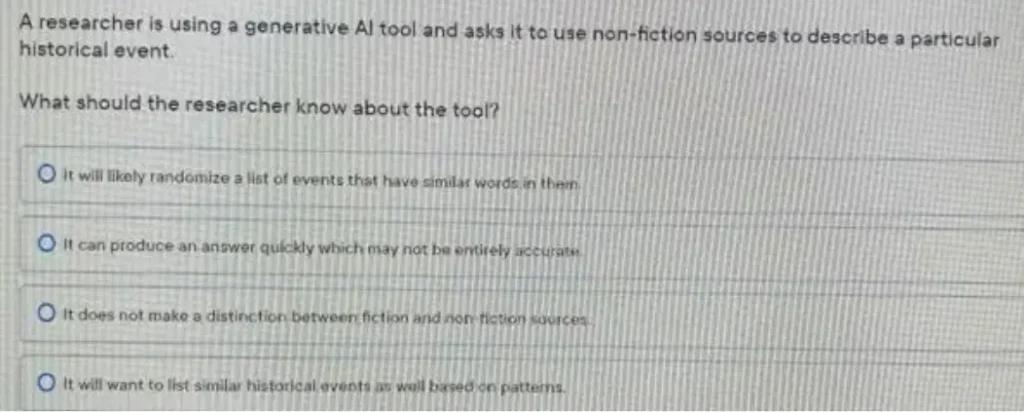Fdaytalk Homework Help: Questions and Answers: A researcher is using a generative AI tool and asks it to use non-fiction sources to describe a particular historical event. What should the researcher know about the tool?

a) It will likely randomize a list of events that have similar words in them
b) It can produce an answer quickly which may not be entirely accurate
c) It does not make a distinction between fiction and non-fiction sources
d) It will want to list similar historical events as well based on patterns
Answer:
First, let’s understand what generative AI tools are designed to do:
- They are trained on large datasets to generate human-like text.
- They don’t have real-time access to a curated database of verified information.
- They generate responses based on patterns in their training data.
Now, let’s determine the correct statement about what the researcher should know about the generative AI tool.
Given Options: Step by Step Answering
a) It will likely randomize a list of events that have similar words in them
- This statement suggests that the AI will generate events based on word similarity without much regard for accuracy or relevance. This is not typical behavior for generative AI. While AI may sometimes include irrelevant information due to keyword similarity, it does not typically “randomize” lists in this manner.
b) It can produce an answer quickly which may not be entirely accurate
- This statement highlights a common characteristic of generative AI: the ability to generate responses quickly, but with potential inaccuracies. This is a well-known limitation of current AI models, which can sometimes provide plausible sounding but incorrect information.
c) It does not make a distinction between fiction and non-fiction sources
- This statement is largely true. Generative AI models typically do not inherently distinguish between fiction and non-fiction sources unless explicitly programmed or instructed to do so. They generate responses based on patterns learned from their training data, which can include both types of sources.
d) It will want to list similar historical events as well based on patterns
- This statement implies that the AI might list similar events due to pattern recognition in its training data. While AI can sometimes provide context or related events, it doesn’t “want” anything; it simply follows the patterns it has learned.
Conclusion
Based on the analysis, the most accurate statements about the generative AI tool in this context are
b) It can produce an answer quickly which may not be entirely accurate
c) It does not make a distinction between fiction and non-fiction sources
However, if we must choose only one, the most pertinent statement is:
b) It can produce an answer quickly which may not be entirely accurate
Generative AI can rapidly provide historical information, but researchers should verify its accuracy using reliable sources.
Learn More: Fdaytalk Homework Help
Q. Which statement is true about prompt engineering for an ambiguous situation?
Q. A user is combining RAG techniques with a ChatGPT prompt. What will this achieve?

